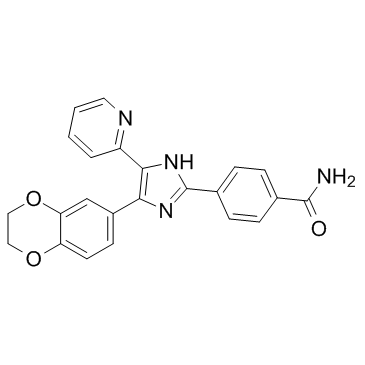D4476

D4476 structure
|
Common Name | D4476 | ||
|---|---|---|---|---|
| CAS Number | 301836-43-1 | Molecular Weight | 398.414 | |
| Density | 1.3±0.1 g/cm3 | Boiling Point | 675.0±55.0 °C at 760 mmHg | |
| Molecular Formula | C23H18N4O3 | Melting Point | N/A | |
| MSDS | Chinese USA | Flash Point | 362.0±31.5 °C | |
|
Acetylation of Beclin 1 inhibits autophagosome maturation and promotes tumour growth.
Nat. Commun. 6 , 7215, (2015) Beclin 1, a protein essential for autophagy, regulates autophagy by interacting with Vps34 and other cofactors to form the Beclin 1 complex. Modifications of Beclin 1 may lead to the induction, inhibition or fine-tuning of the autophagic response under a vari... |
|
|
Small molecule-directed immunotherapy against recurrent infection by Mycobacterium tuberculosis.
J. Biol. Chem. 289(23) , 16508-16515, (2014) Tuberculosis remains the biggest infectious threat to humanity with one-third of the population infected and 1.4 million deaths and 8.7 million new cases annually. Current tuberculosis therapy is lengthy and consists of multiple antimicrobials, which causes p... |
|
|
The selectivity of protein kinase inhibitors: a further update.
Biochem. J. 408 , 297-315, (2007) The specificities of 65 compounds reported to be relatively specific inhibitors of protein kinases have been profiled against a panel of 70-80 protein kinases. On the basis of this information, the effects of compounds that we have studied in cells and other ... |
|
|
D4476, a cell-permeant inhibitor of CK1, suppresses the site-specific phosphorylation and nuclear exclusion of FOXO1a.
EMBO J. Rep. 5 , 60-65, (2004) The protein kinase CK1 phosphorylates serine residues that are located close to another phosphoserine in the consensus pSer-Xaa-Xaa-Ser. This specificity generates regions in its target proteins containing two or more neighbouring phosphoserine residues, term... |
|
|
Type I Interferons Control Proliferation and Function of the Intestinal Epithelium.
Mol. Cell. Biol. 36 , 1124-35, (2016) Wnt pathway-driven proliferation and renewal of the intestinal epithelium must be tightly controlled to prevent development of cancer and barrier dysfunction. Although type I interferons (IFN) produced in the gut under the influence of microbiota are known fo... |